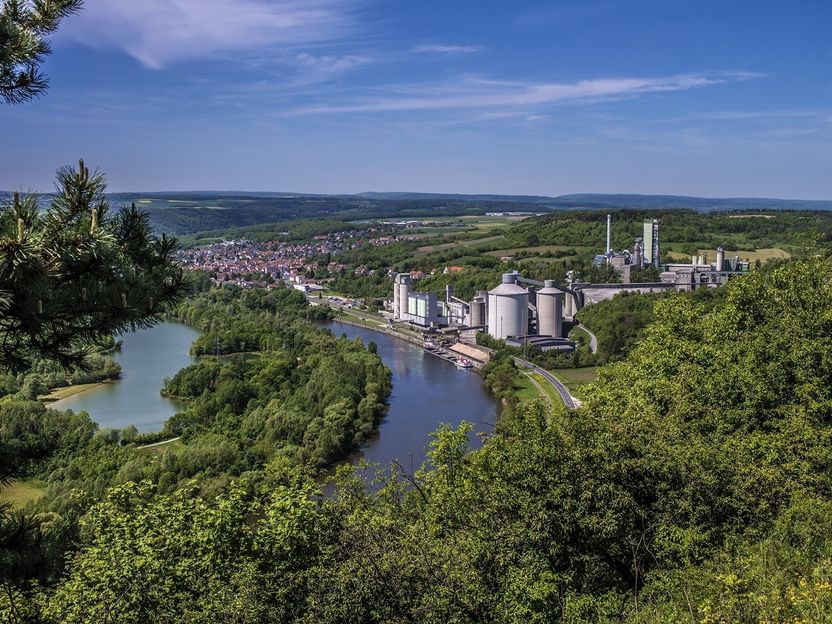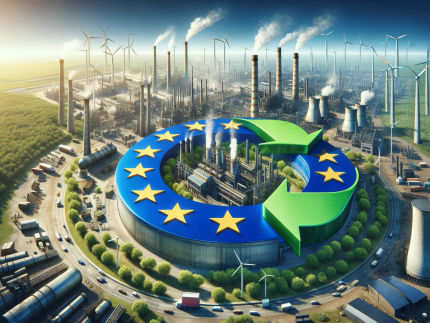Linde and Heidelberg Materials Announce Large-Scale Carbon Capture Project
The facility is scheduled to go into operation as early as 2025 with a capture capacity of around 70,000 tonnes of CO₂ per year
Heidelberg Materials and Linde have established a joint venture under the name "Capture-to-Use" (CAP2U) to build and operate a state-of-the-art carbon dioxide capture and liquefaction plant. The world's first industrial-scale carbon capture and utilisation (CCU) facility in the cement industry is scheduled to start operations in 2025 at Heidelberg Materials' Lengfurt plant in Germany. The facility will enable the captured CO₂ from cement production to be reused as a valuable raw material in manufacturing applications. The planned volume of purified and liquefied CO₂ is around 70,000 tonnes per year.

German Lengfurt cement plant
HeidelbergCement AG, Steffen Fuchs
The majority of the CO₂ generated will be marketed by Linde as part of the joint venture. Thanks to its purity, the processed gas can be used in both the food and chemical industries, for example in carbonated mineral water. A smaller proportion will be used by Heidelberg Materials to drive forward new CO2 recycling and recarbonation technologies.
For the implementation of this project, the substantial contributions of both partners will be supplemented by funding of around €15 million from the Decarbonisation of Industry funding programme on behalf of the German Federal Ministry for Economic Affairs and Climate Action (BMWK).
”We are pleased to implement the world's first large-scale CCU project in the cement industry together with our partner Linde,” says Dr Dominik von Achten, Chairman of the Managing Board of Heidelberg Materials . “As part of our ambitious global CCUS strategy, we are currently driving forward a number of different industrial-scale carbon capture and utilisation projects. This way, we aim to identify viable and efficient ways to reduce our carbon footprint and reuse CO2. The project in Lengfurt is scheduled to go into operations as early as 2025. The BMWK funding shows the importance that the German government also attaches to our joint project.”
”For our customers, a secure, high-quality supply of CO2 produced in a climate-friendly manner is of particularly high importance,” says Dr Mathias Kranz, Vice President On-Site & Bulk Linde GmbH, outlining
the requirements for a CO2 supply. ”With our partner Heidelberg Materials and the plant in Lengfurt, we will not only be able to expand our supply in the future, but also provide CO2 in a sustainable and climate-friendly way with short transport routes.”
”Climate protection is one of the most urgent challenges our industry is facing," says Jürgen Nowicki, Executive Vice President Linde plc and CEO of Linde Engineering. ”With this joint venture, two global leaders in their field are combining their expertise to create a solution that is as sustainable as it is economical. Following successful pilot applications, this industrial-scale facility will pave the way for sustainable cement production.”
The plant is being designed and built by Linde Engineering – one of the leading companies for CO₂ facilities. Based on an amine scrubbing system specially developed for flue gases, the carbon dioxide will be separated directly from part of the exhaust gas stream from the cement clinker kiln. Equipment for purification and liquefaction, tanks for intermediate storage of the product, and loading facilities are also part of the project scope.
Linde brings to the joint venture its expertise in forward-looking, gas-based environmental technologies that allow customers around the world to increase their productivity while reducing their environmental footprint.
Heidelberg Materials, the pioneer on the path to carbon neutrality in its industry, has already successfully tested CO2 capture based on amine scrubbing technology on an extended laboratory scale at its Norwegian cement plant in Brevik between 2012 and 2016.
Most read news
Topics
Organizations
Other news from the department business & finance

Get the chemical industry in your inbox
By submitting this form you agree that LUMITOS AG will send you the newsletter(s) selected above by email. Your data will not be passed on to third parties. Your data will be stored and processed in accordance with our data protection regulations. LUMITOS may contact you by email for the purpose of advertising or market and opinion surveys. You can revoke your consent at any time without giving reasons to LUMITOS AG, Ernst-Augustin-Str. 2, 12489 Berlin, Germany or by e-mail at revoke@lumitos.com with effect for the future. In addition, each email contains a link to unsubscribe from the corresponding newsletter.

























































